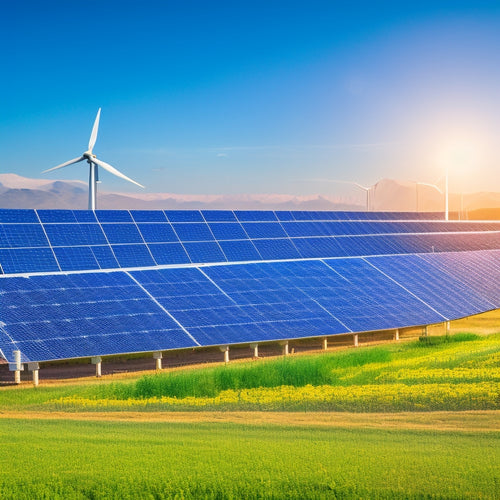
Get the Most Out of Your Roofing and Solar Services
Share
To get the most out of your roofing and solar services, start by ensuring a seamless integration between the two systems for enhanced energy efficiency. Invest in high-quality materials that promise durability and longevity. Regular maintenance is essential; it extends the lifespan of both systems while preventing costly repairs. Tailor your solar setup based on an accurate assessment of your energy needs to optimize performance and savings. Utilizing rebates and energy storage can further enhance your investment. Investigate more strategies to maximize energy production and efficiency for a truly sustainable home.
At a Glance
- Conduct regular preventive inspections to identify issues early, maximizing the longevity and efficiency of both roofing and solar systems.
- Optimize solar panel positioning and shading analysis to enhance energy production and reduce reliance on the grid.
- Invest in high-quality materials for roofing and solar installations to ensure durability and minimize future repair costs.
- Perform energy audits to understand consumption patterns and align solar system size with your energy needs for optimal savings.
- Utilize energy storage solutions to capture excess energy and increase your energy independence while reducing utility costs.
Cost-Effective Long-Term Investment
Investing in roofing and solar services can greatly reduce your energy costs over time while enhancing your property's value.
With financial incentives, such as tax credits and rebates, you can lower upfront installation costs and maximize your savings.
With minimal maintenance and impressive longevity, these systems offer you a sustainable solution that pays off in the long run.
Energy Savings Overview
A considerable number of homeowners are finding that integrating roofing and solar services can lead to substantial energy savings over time. By utilizing renewable energy, you can greatly reduce your reliance on traditional power sources, translating to lower utility bills.
When you install solar panels on your new or upgraded roof, you're not just enhancing your home's aesthetic; you're making a smart investment. These systems work in tandem to maximize energy efficiency, allowing you to produce your own electricity and potentially sell excess energy back to the grid.
In many regions, government incentives and tax credits make the initial investment more manageable, further enhancing your savings. Over time, the reduction in utility bills can lead to a return on investment that's hard to ignore.
Moreover, the stability of renewable energy prices can protect you from the unpredictable fluctuations of fossil fuel prices. By choosing to go solar, you're not just cutting costs; you're embracing energy independence.
It's about taking control of your energy future and enjoying the financial freedom that comes with it. Investing in roofing and solar services isn't just practical; it's a step towards a sustainable lifestyle.
Maintenance and Longevity Benefits
Integrating roofing and solar services not only increases energy savings but also greatly improves the longevity and maintenance of your home. By combining these systems, you create a cohesive protective layer that enhances overall durability.
Regular preventive inspections are vital; they help identify potential issues before they escalate, guaranteeing your roof and solar panels function at their best.
Moreover, seasonal adjustments are important in maintaining efficiency. As weather conditions change, your solar panels may require realignment or cleaning to maximize energy capture. Your roofing system might also need minor repairs to withstand seasonal shifts.
By addressing these factors, you can extend the lifespan of both your roof and solar infrastructure. This proactive approach not only reduces long-term costs but also grants you the freedom from unexpected repairs or replacements.
Imagine the peace of mind knowing your home is equipped to face any weather challenge while generating energy. Investing in these maintenance practices isn't just about immediate savings; it's about securing a sustainable future for your property.
Enhanced Energy Efficiency
To achieve enhanced energy efficiency, understanding insulation benefits is vital in maintaining ideal indoor temperatures.
By combining effective insulation with solar energy optimization techniques, you can greatly reduce your energy consumption and costs. This is particularly important, as advancements in solar technology continually improve energy conversion rates, allowing homeowners to maximize the benefits of their solar panels.
Implementing these strategies not only enhances your home's performance but also contributes to a more sustainable environment, as solar panel efficiency and technology plays a key role in reducing your carbon footprint.
Insulation Benefits Explained
Many homeowners overlook the important role insulation plays in enhancing energy efficiency. Proper insulation not only keeps your home comfortable year-round but also greatly reduces energy costs. Various insulation types, such as fiberglass, cellulose, and spray foam, cater to different needs and preferences. Understanding these options allows you to make informed decisions customized to your home's unique requirements.
Effective installation techniques are essential in maximizing the benefits of insulation. For instance, ensuring that insulation is evenly distributed in attics, walls, and floors can prevent air leaks that lead to energy loss.
You might consider professional installation for complex areas, as proper sealing and positioning can make a considerable difference in performance.
Investing in quality insulation not only enhances your home's energy efficiency but also increases its overall value. As energy costs rise, the freedom that comes with lower utility bills becomes increasingly appealing.
Solar Energy Optimization Techniques
Optimizing solar energy can greatly enhance your home's energy efficiency and reduce utility costs. To fully utilize your solar power system, consider imperative techniques like solar panel positioning and shading analysis. Properly orienting your panels maximizes sunlight exposure, while shading analysis guarantees that trees or structures don't obstruct performance.
Additionally, energy storage solutions are essential for capturing excess energy generated during peak sunlight. This stored energy can be used later, reducing reliance on the grid and enhancing independence. Implementing grid integration strategies helps you seamlessly connect with the utility grid, allowing you to benefit from net metering, which credits you for excess energy fed back to the grid.
Utilizing solar technology advancements and performance monitoring tools enables you to track your system's efficiency and catch potential issues early. Don't overlook incentive programs that can offset installation costs, making solar even more accessible.
Here's a quick summary of these techniques:
| Technique | Benefits | Considerations |
|---|---|---|
| Solar Panel Positioning | Maximizes sunlight exposure | Requires proper installation |
| Energy Storage Solutions | Reduces reliance on the grid | Initial investment needed |
| Grid Integration Strategies | Enables net metering benefits | Compatibility with local laws |
Key Benefits of Installation
Installing a new roofing system or solar panels can lead to significant energy cost savings, reducing your monthly bills.
By integrating home energy storage, you can further enhance your energy independence and control, allowing for effective use of renewable energy sources energy independence benefits.
Additionally, these enhancements can elevate your property's value, making it more attractive to potential buyers.
Energy Cost Savings
Investing in solar installation can greatly reduce your energy bills and improve your property's overall efficiency. By utilizing the sun's power, you can generate your own electricity, considerably lowering your dependence on utility companies. This shift not only saves you money but also gives you more control over your energy consumption.
To maximize these savings, consider scheduling energy audits. These assessments help identify areas where you can improve energy efficiency, ensuring you get the most out of your solar system. They pinpoint opportunities for upgrades, allowing you to minimize waste and optimize performance.
Additionally, take advantage of utility incentives that many providers offer for solar installation. These programs can offset initial costs, making solar installation even more accessible and financially appealing. By taking advantage of these incentives, you can accelerate your return on investment and further improve your energy independence.
Ultimately, investing in solar isn't just about cutting costs; it's about claiming your freedom from rising energy prices and contributing to a sustainable future. Accept the change and experience the benefits of reduced energy expenses, improved efficiency, and the enablement that comes with energy independence.
Increased Property Value
Adding solar panels to your property not only enhances energy efficiency but also greatly raises its market value. By investing in solar, you're not just cutting energy costs; you're also increasing your property appeal in a competitive market. Homebuyers increasingly prioritize energy-efficient features, which means your solar installation can make your property more attractive to potential buyers.
Here's a quick overview of how solar panels improve property value:
| Feature | Benefit | Impact on Market Demand |
|---|---|---|
| Energy Efficiency | Lower utility bills | High |
| Environmental Appeal | Sustainable living | Growing |
| Increased Property Value | Higher resale potential | Strong |
| Long-term Investment | Reduced reliance on utilities | Attractive |
With rising energy costs and a growing focus on sustainability, properties equipped with solar panels are becoming more sought after. So, if you're looking to raise your home's value while embracing freedom from high energy bills, solar panels are an excellent choice. The combination of improved property appeal and increasing market demand makes this investment a win-win. Don't miss out on the benefits!
Selecting Based on Energy Needs
To choose the right solar system, you need to assess your energy consumption accurately. Understanding how much energy you use allows you to evaluate system efficiency and guarantee peak performance.
This assessment is vital for determining the size of the solar panel array and the capacity of the battery system you'll require. By aligning your energy needs with the right installation, you can maximize savings and energy production while taking advantage of government incentives that can help offset installation costs.
Assessing Energy Consumption
Understanding your energy consumption is essential when selecting the right roofing and solar solutions for your home. By conducting energy audits, you can identify consumption patterns that reveal how much energy you use and where you can make improvements. This knowledge enables you to make informed decisions that align with your energy needs and lifestyle.
To help you visualize your energy consumption, consider the following table:
| Energy Source | Monthly Consumption (kWh) | Cost ($) |
|---|---|---|
| Electricity | 800 | 100 |
| Heating | 300 | 50 |
| Cooling | 400 | 70 |
| Water Heating | 200 | 30 |
Analyzing this data allows you to pinpoint areas for potential savings. For example, reducing heating or cooling needs can greatly affect overall consumption. By understanding your usage trends, you can choose roofing materials and solar systems that optimize efficiency and generate the freedom of lower energy bills. Ultimately, knowing your energy consumption helps you select solutions that not only meet your current demands but also accommodate future needs.
Evaluating System Efficiency
Efficiency is essential when selecting roofing and solar systems that align with your energy needs. By focusing on system performance, you can guarantee your investment pays off in the long run.
Start by evaluating efficiency metrics, such as the solar panel's wattage and the roofing material's insulation properties. High-efficiency solar panels generally produce more energy, reducing your reliance on the grid and ultimately lowering your energy bills.
Consider your current and future energy demands. Calculate your average monthly usage to determine the size and capacity of the solar system you need. A customized approach will help you avoid over or under-investing in your system, allowing for peak energy independence.
Don't forget to examine how roof orientation and tilt affect solar panel output. Proper installation enhances system performance, making sure you capture the maximum amount of sunlight.
Superior Durability and Lifespan
When choosing roofing and solar materials, you're making an essential decision that affects durability and lifespan.
High-quality materials can greatly enhance the longevity of your system, ensuring it withstands environmental challenges.
Materials Impact Longevity
The choice of materials plays a critical role in determining the longevity of roofing and solar systems. When you invest in high-quality material types, you're not just enhancing durability; you're ensuring your system withstands the test of time. Coupled with proper installation techniques, the right materials can greatly extend the lifespan of your investment.
Here's a quick comparison of popular materials used in roofing and solar installations:
| Material Type | Longevity (Years) | Installation Technique |
|---|---|---|
| Asphalt Shingles | 15-30 | Standard Overlay |
| Metal Roofing | 40-70 | Seamed or Screw-Down |
| Tile Roofing | 50-100 | Interlocking or Mortar |
| Solar Panels | 25-30 | Fixed Rack Systems |
Choosing the right material type not only enhances the aesthetic appeal but also provides peace of mind regarding performance. Remember, a well-constructed system can liberate you from costly repairs and replacements down the line. Prioritize quality materials and expert installation to truly maximize your roofing and solar experience. Your investment deserves nothing less.
Frequently Asked Questions
How Often Should I Inspect My Roof and Solar Panels?
You should inspect your roof at least twice a year and after severe weather. Regular checks enhance solar panel longevity and guarantee your roof's integrity, preventing costly repairs and maximizing your system's efficiency.
Can I Install Solar Panels on an Existing Roof?
Did you know that over 80% of homes can support solar panel installation? Verify your roof's integrity meets installation requirements before proceeding. With proper assessment, you can utilize solar energy without compromising your home's structure.
What Maintenance Do Roofing and Solar Systems Require?
Your roofing and solar systems need regular roof inspections and solar cleaning. These practices protect your investment, enhance efficiency, and guarantee longevity. Stay proactive to maintain performance and enjoy the freedom of worry-free energy solutions.
Are There Financing Options for Roofing and Solar Installations?
Imagine financing your new roof and solar installation with a low-interest loan. You've got various financing alternatives available, helping you manage installation costs while enhancing your home's value and energy efficiency. Don't miss out!
How Do Weather Conditions Affect Solar Panel Efficiency?
Weather conditions considerably impact solar panel performance. Cloud cover and heavy rain can reduce efficiency, while sunny days enhance energy production. Understanding this relationship helps you optimize your solar system for maximum freedom and energy independence.
Explore More
By choosing the right roofing and solar services, you're not just investing in your home; you're investing in your future. Like a well-tended garden, your energy efficiency blossoms, yielding savings over time. With superior durability and customized solutions for your energy needs, you're setting the stage for long-term benefits. Don't let this opportunity pass you by—embrace the sunshine and safeguard your investment. Your roof can be the shield against rising costs while nurturing a sustainable lifestyle.
Related Posts
-

Best Solar Powered Flashlights for Emergency Situations
When you're choosing the best solar-powered flashlights for emergency situations, focus on their brightness, battery ...
-

The Role of Battery Monitoring Systems in Renewable Energy
Battery monitoring systems play an essential role in renewable energy by enhancing system longevity and optimizing pe...
-

Smart Grid Technology Implementation Challenges
You'll encounter several challenges when implementing smart grid technology, particularly in cost management, scalabi...


